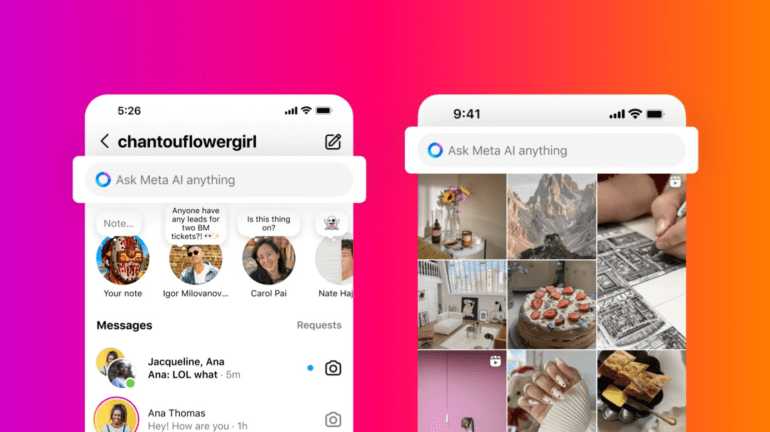- Meta integrates Llama 3-powered AI chatbot into search bars of Facebook, Messenger, Instagram, and WhatsApp.
- New features include faster image generation and access to web search results.
- The expansion marks Meta’s push to establish dominance in the consumer AI landscape.
- Meta AI rollout spans over a dozen countries, excluding India from the latest expansion.
- Enhanced functionality includes fetching web-related info and improving image quality.
- Meta aims to embed Meta AI in various touchpoints, including social feeds and hardware devices.
Main AI News:
In a strategic move aimed at bolstering its AI services, Meta has integrated its latest Large Language Model, Llama 3, into the search bars of its flagship apps: Facebook, Messenger, Instagram, and WhatsApp. This deployment spans multiple countries, marking a significant enhancement to Meta’s AI capabilities. Accompanying this advancement are several new features, including accelerated image generation and seamless access to web search results.
This initiative builds upon a recent TechCrunch report revealing Meta’s testing of AI integration within Instagram’s search bar. Furthermore, Meta has unveiled a dedicated meta.ai website, providing users with streamlined access to the AI chatbot.
These developments underscore Meta’s commitment to establishing itself as a prominent player in the burgeoning consumer AI landscape. With competition intensifying, Meta CEO Mark Zuckerberg touts Meta AI as a leading intelligent assistant, positioning it favorably against rival offerings like those from OpenAI.
Initially launched in the U.S. last year, Meta AI is now expanding its reach across English-speaking markets, encompassing over a dozen countries, including Australia, Canada, and Nigeria. Despite ongoing tests in countries like India, Meta has excluded them from the latest expansion, citing a desire to refine the AI’s performance further.
Enhanced Functionality and Reach
Meta AI’s repertoire now includes the ability to fetch web-related information from Google and Bing, in addition to its existing capabilities like generating writing prompts and recipes. Moreover, the AI’s image generation speed has been augmented, allowing users to animate images or convert them into GIFs seamlessly. Notably, Meta emphasizes improvements in image quality and spelling accuracy within AI-generated content.
Amidst its proliferation strategy, Meta aims to embed Meta AI across various touchpoints, spanning search bars, individual/group chats, and social feeds. Users can leverage the AI to glean insights from their Facebook feeds, such as querying about optimal times to witness natural phenomena like the aurora borealis in Iceland.
Expanding Beyond Apps
Beyond its app ecosystem, Meta is extending the reach of Meta AI to hardware devices. Already accessible on Ray-Ban smart glasses, Meta AI is slated for integration into the Meta Quest headset in the near future, further solidifying its omnipresence in the digital realm.
Navigating Challenges
Despite its widespread adoption, Meta acknowledges the challenges posed by AI’s propensity for generating erroneous or nonsensical responses. Instances of misinformation or inappropriate content underscore the need for robust content moderation mechanisms. Meta remains committed to refining its AI models through continuous updates and enhancements, aiming to mitigate such risks and deliver a more reliable user experience.
Conclusion:
Meta’s integration of its Llama 3-powered AI chatbot into its major apps and expansion across multiple countries signifies a strategic move to solidify its position in the consumer AI market. By offering enhanced functionality and accessibility, Meta aims to compete effectively against other AI services, signaling a potential shift in consumer preferences towards AI-powered assistance across digital platforms.

